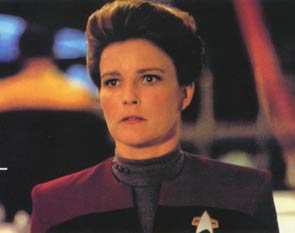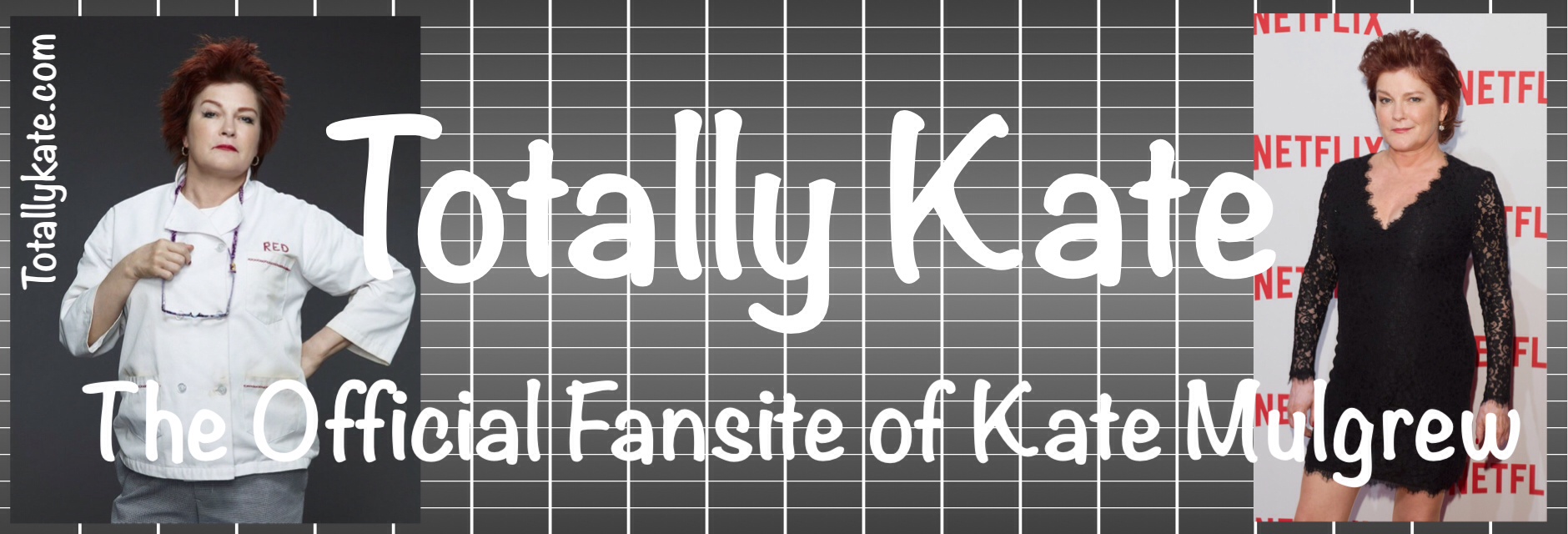|
February 2001 |
 |
|
February 2001 |
 |
|
Kate Mulgrew talks about Captain Janeway, the Borg and Life after Voyager. By Melissa J. Perenson |
The past seven years, reflects Kate Mulgrew, have been akin to “a kind of time warp—very Science Fiction [like].”Mulgrew knows whereof she speaks. As Captain Kathryn Janeway on Star Trek Voyager, she’s helmed the wayward Federation ship on its long journey home. At the midpoint of filming for Voyager’s 7th and final season, the actress takes a few moments out from her hectic schedule to share her thoughts as the show heads into the final stretch.
“It’s very hard for me to believe it has passed, and at this rate,” she continues. “But it’s total immersion, this kind of work—certainly it was for the first two or three years. Things got easier after that, for a number of reasons: confidence, relaxation, familiarity. I feel that I’ve been able to really dance with Janeway with impunity and freedom. And I’ve enjoyed pretty much every moment of it.”
“Of course,” she adds candidly, “there have been moments where I’ve wanted to kill people, but why should I be unlike anybody else?”
Not that Mulgrew would ever be mistaken for just anybody else. In spite of her petite frame, the chestnut-haired actress carries a formidable and commanding presence—whether on the bridge or on the soundstage. Yet she also brings an elegance to the captain’s chair that was lacking in previous Treks—even as she upholds the diplomatic traditions of Picard and displays a streak of Kirk’s attitude, Mulgrew’s Janeway is very human, be it in her mentoring of Seven of Nine or her camaraderie with Chakotay. And, ultimately, she’s left her mark on Trek as the franchise’s first female captain to head a weekly series.
“I know her better than anyone at this point,” she states firmly. Her intimate knowledge of Janeway gives Mulgrew a luxury few actors get to enjoy in their careers: creative flexibility to infuse a scene with something of her own. “I do what I want. Sometimes I’m shot down,” she concedes, “but not often. My instincts and my intuition are pretty good. I know her, I’m very active in the rehearsal process: I find it’s a wonderful and creative [time]. It’s the best part of the day.”
Having that kind of latitude is important, but as Mulgrew notes, the moments she feels most alive on the show stem from the printed page of the script itself. The key, she says, is “good writing. If it’s not on the page, it really can’t happen. No actor, however talented, can lift it up if it’s not there in the first place.”
In the beginning, though, that intangible “it” wasn’t on the page for Janeway; Mulgrew, and even audiences, realized that the show’s writers were trying to find a balance for Janeway—without much success. “I think there was initially a struggle with my being a woman, and they were concerned about my inherent command and authority,” muses Mulgrew. “But once I was established, I think they took a deep breath and, from watching the dailies and watching this character evolve through me, they have entrusted her to me.”
Possession is a two-way street, though, and Mulgrew has found that much of her own evolution as a person and an actress over the past seven years is inextricably linked to the journey of her onscreen alter ego. “It’s a real marriage at this point,” she says. At the outset, “I was very focused on Captain Janeway. And then, as the years went by, I found the courage and found a way, and the ways were provided for me, by the writers, to ally myself to Janeway in the best possible ways. I am a person, I am an actress—and of course it is only myself who can endow this character with life.”
The journey began with Janeway seeing Voyager through its first crisis after the ship suddenly finds itself stranded in the Delta Quadrant And she’s come a long way since those early days. “If I were to sketch her journey, it began with a kind of heightened authority, a kind of terrible dilemma—which immediately indicated to the audience what kind of a woman within the captain they were dealing with. She’s philosophical, she’s capable of taking great, and occasionally questionable, risks, but she is [first] a devoted captain,” says Mulgrew. “I think we’ve seen her evolve into a more relaxed and confident person. A more thoughtful person. A more reflective person.”
Ultimately, it will be up to audiences to gauge whether Janeway’s mission has been a success. But already—in spite of early resistance to the seemingly ‘progressive” idea of having a female captain—the history books seem destined to look favorably upon the impact and contribution Janeway—and Mulgrew—have made to the Trek canon. Never mind the occasional and outspoken critics of Voyager’s quality: There’s a bigger-picture cultural significance to Mulgrew’s seven-year run as captain.
“It wasn’t until the years unfolded that I understood the full measure of her influence, and mine, as a role model. I’ve taken my influence on young women seriously. I’ve tried to be vigilant about it, I’ve tried to share as much as I can of myself and my philosophy with these young women, and to encourage them to understand that the sky’s the limit,” enthuses Mulgrew.
For all of Voyager’s fabled 17-hour days and last-minute script revisions, Mulgrew appreciates the experience the series has afforded her on both a personal and professional level. “The work has been grand, the role has been—clearly—a once-in-a-lifetime opportunity,” she says. “But what I will remember and what I will struggle with throughout the rest of this season and for the years to come, will be the extraordinary relationships which I’ve developed in this foxhole.”
There’s unquestionably a sense of being in the trenches, she continues. “That’s the absolute metaphor for it. We go into a darkened soundstage very early in the morning; we do not emerge until late at night. We are thrown into any number of situations that force us to reveal ourselves to one another in ways that we probably haven’t revealed ourselves to our own family members. It’s a pressure-cooker environment, and the flip side of that is one of terrific levity, absurdity, lunacy. Frequently there’s joy; often, there’s creative conflict which resolves itself interestingly between people. That’s the nature of the beast.”
Ironically, even after having had seven years to prepare for the end of the series, Mulgrew admits, “I’m not sure I envisioned it. I think at this point, I’m living it. I think it’s interesting the way that they seem to be delaying getting us home. They’re giving everybody equal time in an effort to make up, perhaps, for a lack of that in the past couple of seasons, when the emphasis was so clearly on Seven of Nine. The writers need to be more democratic, and they’re being that way this season.”
The 6th season, confirms Mulgrew, “was imbued with a kind of collective confidence which now gives way to wrapping up some of the interpersonal stories in the 7th season. We want to find out who loves who, what’s going to happen to everybody. Will these dilemmas be resolved, for instance, between the Maquis and Starfleet? What’s going to happen to Seven of Nine, what’s going to happen to Janeway, if and when she gets this ship home? To whom is she most deeply connected? They’re going to flesh out the story between B’Elanna Torres and Tom Paris. Are we going home, are we not, if we’re not—what’s going to happen? And so on, and so forth.”
There are three things that Mulgrew would like to see addressed from Janeway’s perspective before the series concludes. “I think in these last 10 episodes, it would be wonderful—not to put too fine a point on it—to fully resolve this relationship between Chakotay and Janeway, which is an intimate relationship without the sexual ramifications. And I think it is very important that the captain say goodbye to each of her senior officers, in her own way. And by that I mean there should be introspective scenes, scenes that are clearly about character and not about plot. I think that that’s the way to comfort not only us, but the audience, who now is going to be saying goodbye to a family.”
Before the crew of Voyager says goodbye, though, odds are they’ll encounter their long-time nemesis the Borg again—a prospect that doesn’t particularly enthrall Mulgrew. “I myself am a little tired of the Borg theme; it seems to have played itself out, but I thought that ‘Unimatrix I’ and ‘II’ were very well written and very well executed, and I enjoyed every minute of them.”
Including the arduous three-hour makeup job required to turn her into a Borg? “Yeah, I don’t mind that, I’ve been through that in my life,” she says as a matter-of-fact. “That didn’t bother me; I think actors put too much emphasis on that stuff. I very much enjoyed my scenes with Susanna Thompson, whom I admire deeply as an actress.”
The episodes that carry the most resonance for Mulgrew are the ones that give her something to sink into. “Always, I think the more dramatic scripts are certainly more compelling for me. They strike a wonderful balance,” she maintains. “Science Fiction, it is action oriented, but I love it when Janeway gets scientifically very involved. And I’m always intrigued when there’s a moral dilemma of substance.”
Harder to find was the balance between her personal and professional life. “I haven’t managed it very well,” Mulgrew admits. “It’s been very difficult. And I’ve paid the price for that. That’s all I did for seven years, was raise my kids and go to work—there was no other life.”
When she regains her life after Voyager, Mulgrew is looking forward “to understanding myself without a call sheet. I’m looking forward to understanding my marriage. It will be a tremendous anticlimax at the end of this affair, and I will have to steady myself for that.” She also has tentative plans to return to the theater, but makes clear that her family is her first and foremost priority. “My heart tells me that I will just take some time. I’d just like to give my time, my heart, and my life to my loved ones.”
“[For now] my thoughts are introspective. They’re reflective, more than anything else. This is the end of a remarkable chapter in my life.”
 |